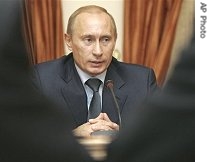2007年VOA标准英语-Russia Suspends Participation in European Arms(在线收听)
Moscow
14 July 2007
Russia has suspended its participation in a European arms control treaty, because of what the Kremlin has described as "extraordinary circumstances." From Moscow, Bill Gasperini has more for VOA on what is being viewed as another sign of the strained relations between and the west.
 |
| Russian President Vladimir Putin |
The suspension was not unexpected, as Mr. Putin has previously said he might freeze compliance with the document due to what the Kremlin views as NATO intransigence on key aspects of the agreement.
The CFE treaty regulates the deployment of troops and military equipment on the continent, and was originally signed by Russia and NATO members in 1990. It was amended in 1999 to reflect changes since the collapse of the Soviet Union, such as requiring Moscow to withdraw all of its forces from former Soviet republics including Moldova and Georgia.
Russia has ratified the later version of the CFE and has pulled some of its forces out of those states. However, NATO members have refused to ratify the amended version until Moscow fully withdraws all its forces.
Kremlin spokesman Dmitry Peskov says Russia can no longer tolerate a situation where it is complying with the treaty while its partners were not.
Russia also accuses the United States and NATO of "undermining stability" in Europe with plans to deploy a missile defense system in Poland and the Czech republic.
As a result of its suspension, the Russian Foreign Ministry says Moscow will halt all inspections of military sites by NATO countries and will not limit the number of its conventional weapons, such as tanks, artillery and combat vehicles in Europe.
However, Foreign Ministry spokesman Sergei Kislyak left open the door to a negotiated solution to the impasse.
Kislyak says that Russia is not against dialogue aimed at resolving the problem, and that Moscow invites its Western partners to engage in dialogue to find a way out of the situation.
In Brussels, NATO spokesman James Appathurai condemned the Russian move, saying the alliance "regrets this decision as a step in the wrong direction."
Some military analysts say the suspension is aimed mostly at the missile defense shield standoff, and is not likely to result in a build-up of Russian military forces near its borders.